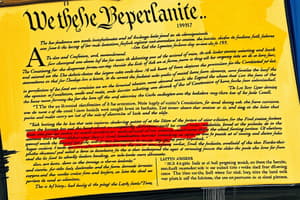Podcast
Questions and Answers
What was the significance of the Bill of Rights in the formation of the new government?
What was the significance of the Bill of Rights in the formation of the new government?
- It was unnecessary as the Constitution already protected individual rights.
- It was designed to protect individuals from potential government abuse. (correct)
- It granted additional powers to the federal government over the states.
- It ensured that the government could operate without limitations.
Which of the following was NOT a responsibility or role of Alexander Hamilton in the early U.S. government?
Which of the following was NOT a responsibility or role of Alexander Hamilton in the early U.S. government?
- Secretary of Treasury
- Devising a national economic strategy
- Secretary of State (correct)
- Creating Customs Service
What major economic challenge did the U.S. face immediately after adopting the Constitution?
What major economic challenge did the U.S. face immediately after adopting the Constitution?
- The need to fund military protection of the frontier (correct)
- High unemployment rates
- Surplus of gold and silver reserves
- Deflation of the dollar currency
Why did some states oppose Hamilton's plan to pay off state debts?
Why did some states oppose Hamilton's plan to pay off state debts?
What was a key feature of the economic measures Hamilton proposed?
What was a key feature of the economic measures Hamilton proposed?
Which right is NOT explicitly guaranteed in the Bill of Rights?
Which right is NOT explicitly guaranteed in the Bill of Rights?
Which of the following statements about George Washington's presidential role is true?
Which of the following statements about George Washington's presidential role is true?
What was a criticism of Hamilton's financial policies by figures like Madison and Jefferson?
What was a criticism of Hamilton's financial policies by figures like Madison and Jefferson?
What was the primary compromise between Hamilton and the opposing leaders Madison and Jefferson?
What was the primary compromise between Hamilton and the opposing leaders Madison and Jefferson?
What was Hamilton's biggest achievement during his administration?
What was Hamilton's biggest achievement during his administration?
Which group primarily opposed the establishment of banks during Hamilton's era?
Which group primarily opposed the establishment of banks during Hamilton's era?
What was the purpose of Washington's Neutrality Proclamation?
What was the purpose of Washington's Neutrality Proclamation?
What event led to President Washington demonstrating the government's ability to use force against rebellion?
What event led to President Washington demonstrating the government's ability to use force against rebellion?
Which statement accurately reflects Washington's farewell address?
Which statement accurately reflects Washington's farewell address?
What was the immediate effect of the XYZ Affair on U.S.-French relations?
What was the immediate effect of the XYZ Affair on U.S.-French relations?
What key principle did Jefferson advocate in response to the Alien and Sedition Acts?
What key principle did Jefferson advocate in response to the Alien and Sedition Acts?
The election of 1800 was significant because it marked:
The election of 1800 was significant because it marked:
Which of the following best describes the sectional differences during Hamilton's time?
Which of the following best describes the sectional differences during Hamilton's time?
Flashcards
First Bank of the United States
First Bank of the United States
Hamilton's plan to establish a national bank, funded by private investors, to regulate currency, make loans, and stimulate the economy.
Whiskey Rebellion
Whiskey Rebellion
Western Pennsylvania farmers revolted against a federal tax on whiskey, demonstrating early tensions between the government and rural areas.
Neutrality Proclamation
Neutrality Proclamation
President Washington's declaration of US neutrality in the French Revolution and subsequent European wars, protecting American trade and preventing entanglements.
Farewell Address
Farewell Address
Signup and view all the flashcards
Quasi-War
Quasi-War
Signup and view all the flashcards
XYZ Affair
XYZ Affair
Signup and view all the flashcards
Federalist Party
Federalist Party
Signup and view all the flashcards
Democratic-Republican Party
Democratic-Republican Party
Signup and view all the flashcards
Alien and Sedition Acts
Alien and Sedition Acts
Signup and view all the flashcards
Kentucky and Virginia Resolutions
Kentucky and Virginia Resolutions
Signup and view all the flashcards
Bill of Rights
Bill of Rights
Signup and view all the flashcards
1st Amendment
1st Amendment
Signup and view all the flashcards
2nd Amendment
2nd Amendment
Signup and view all the flashcards
3rd Amendment
3rd Amendment
Signup and view all the flashcards
4th Amendment
4th Amendment
Signup and view all the flashcards
5th Amendment
5th Amendment
Signup and view all the flashcards
6th Amendment
6th Amendment
Signup and view all the flashcards
7th Amendment
7th Amendment
Signup and view all the flashcards
8th Amendment
8th Amendment
Signup and view all the flashcards
9th and 10th Amendment
9th and 10th Amendment
Signup and view all the flashcards
Hamilton's Economic Plan
Hamilton's Economic Plan
Signup and view all the flashcards
Import Tax (Tariff)
Import Tax (Tariff)
Signup and view all the flashcards
Assumption of State Debts
Assumption of State Debts
Signup and view all the flashcards
National Bank
National Bank
Signup and view all the flashcards
Opposition to Hamilton's Plan
Opposition to Hamilton's Plan
Signup and view all the flashcards
Study Notes
Convening a Congress, Inaugurating a President, Adopting a Bill of Rights
- US Constitution adopted by all 13 states in March 1789
- Washington unanimously elected president
- Faced no precedents to guide him
- Chose a casual presidential palace atmosphere
- Bill of Rights was the first task
- Madison led the effort, influenced by Anti-Federalists' desire for guaranteed rights safeguarding from government abuse.
Creating an Economy: Hamilton and the US Economic System
- US faced significant debt from the war.
- Needed funding for a military and protection of the frontier.
- States/banks printed various dollar denominations, leading to counterfeiting and inflation.
- Congress imposed a 5% tax on imports.
- Congress approved the Presidential Cabinet with key roles (Secretary of State, War, Treasury, Attorney General).
- Hamilton requested a $50,000 loan.
- Established Customs and Coast Guard services
- Hamilton proposed paying off all states' debts to establish credit and borrow money.
- Faced opposition (Madison, Jefferson) due to differing views on national debt burdening states and potentially empowering a powerful Federal government.
- Compromise reached on the location of the national capital in Virginia's Potomac River area.
- Political division emerged: Federalists (mainly North & urban centers) supported Hamilton; Democratic-Republicans (mainly South & rural areas) opposed Hamilton.
Setting the Pace: The Washington Administration
- Internal violence a recurring issue during Washington's presidency.
- Treaty of Greenville forced Native Americans to cede land in Northwest Territories.
- Whiskey Tax and Rebellion arose in 1794, with western Pennsylvania farmers protesting the increased tax.
- Washington led 12,000 troops to quash the rebellion, demonstrating government's power to maintain order.
- Foreign policy dominated Washington's second term amid the French Revolution.
- Neutrality Proclamation declared US neutrality in European conflicts.
- This became foundational US foreign policy until World War 1
- Washington retired after two terms in office.
- Farewell Address emphasized unity, denounced sectionalism, warned against permanent alliances with foreign nations.
The Birth of Political Parties: Adams and Jefferson
- John Adams inherited a naval conflict known as the Quasi-War with France.
- Adams attempted peaceful relations despite Federalist pressure for war.
- The XYZ Affair deteriorated relations further as French diplomats demanded bribes.
- Alien and Sedition Acts restricted free speech, press, and immigration.
- Jefferson countered with the Kentucky and Virginia Resolutions, which challenged the Alien and Sedition Acts.
- The compact theory argued states had the right to nullify these illegal laws.
- Election of 1800 marked a pivotal shift in American politics.
- Jefferson's victory represented the first power transition between political parties and a developing more democratic political atmosphere.
Studying That Suits You
Use AI to generate personalized quizzes and flashcards to suit your learning preferences.




